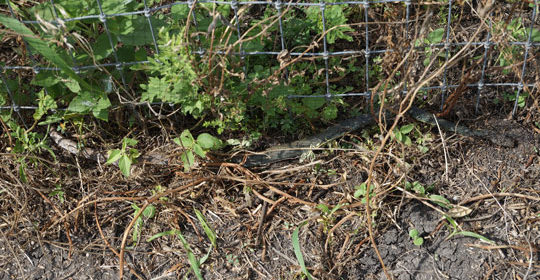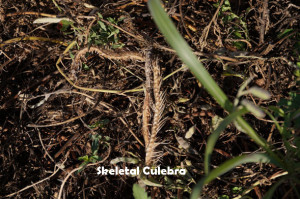You yellow-bellied snake in the grass!

Was that a line in a John Wayne or Clint Eastwood western? Or is it a leftover from a boy’s imagination?
Whatever the origin, recently that epithet immediately came to mind.
When a first glance brought something yellow into view, I asked myself, “Is that really a snake?”
Sure enough it was. At about three feet long and one inch diameter it was just lying there – still – in the tall grass at the edge of my caged garden plot.
It almost looked too real, like a cheap plastic version from the discount aisle at Walmart.
And, it was yellow-bellied. To confirm its demise I approached gingerly and poured water from the sprinkling can on it.
No reaction.
Still, I left it alone, went inside and Googled Texas snakes; that solid yellow underbelly, with consistent grey skin, are easy markers for reference.
For a few days I kept telling myself to go out and bury the thing. I already had the pictures to help the investigation, but I didn’t. I got distracted, which happens all the time transitioning from desk to dirt.
After about a week I finally returned to inter it properly.
But where did it go?
It had disappeared! Did the neighborhood vulture family do their job?
If they had they at least leave a skeleton, a spine. Aha, on second view there was, or at least might be.
Looking very closely I saw what could be the delicate tangle of snake vertebrae.
Did the vultures indeed consume the flesh?
As of this writing the disappearance remains a mystery. But there is confidence telling you that the missing carcass was a non-venomous “Yellow-bellied Water Snake,” [*] which creates a Texas country lesson learned for a greenhorn.
Watch out for snakes, especially when the hay and wildflowers are high; and we were inundated with rain at the time leaving a shallow, partially covering bog as well. These vipers can be underfoot for you, your kid, pooch, and other family animals.
And a personal habit dealing with the animal kingdom is to buy a hard-copy picture reference book: checking out the four-part color pages is a tactile pleasure I haven’t been able to break.
[*See www.enature.com/fieldguides/detail.asp?recNum=AR0819
“Yellow-bellied Water Snake – Nerodia erythrogaster flavigaster. Like all snakes in the genus Nerodia, the Yellow-bellied will bite if harassed. It may also secrete a malodorous musk. Its bite is not venomous.”]

I think the fire ants may have taken care of it!
Thanks, Tom. Fighting them is a constant battle.
Dennis